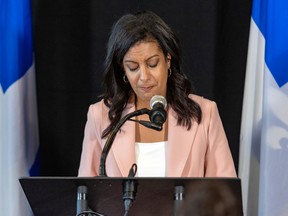Analysis: Can Quebec Liberals recover from the annus horribilis of 2022?
Whoever ends up winning the permanent leadership will be assuming control of a party in tatters and in need of a near-complete rebuild — as well as a raison d’être.
Author of the article:

La Presse Canadienne
Jocelyne Richer
Published Dec 30, 2022 • 4 minute read

The Quebec Liberal Party turned 155 years old in 2022, but this was also a year that saw the party go through the political equivalent of puberty — feeling unloved, confused about itself and uncertain over its future.
Advertisement 2
It was the Liberals’ annus horribilis, with the Oct. 3 election seeing the party record its worst result ever — an unambiguous and massive rejection by Quebec voters.
Montreal Gazette Headline News
Sign up to receive daily headline news from the Montreal Gazette, a division of Postmedia Network Inc.
By clicking on the sign up button you consent to receive the above newsletter from Postmedia Network Inc. You may unsubscribe any time by clicking on the unsubscribe link at the bottom of our emails or any newsletter. Postmedia Network Inc. | 365 Bloor Street East, Toronto, Ontario, M4W 3L4 | 416-383-2300
That defeat sparked a major crisis in the party that saw the leadership of Dominique Anglade openly questioned as she was held responsible for the disastrous election campaign. A month later, Anglade left the party. Once the dust settled, an uncomfortable truth remained: the party of Jean Lesage, Robert Bourassa and Jean Charest had been reduced to a shadow of its former self.
The Oct. 3 election saw the Liberals place fourth out of the five main parties in terms of popular support, although the 14.37 per cent share it garnered under the first-past-the-post system nevertheless allowed it to win 21 seats. But outside of the Montreal area, francophone voters turned their backs on the Liberals, making the party look more than ever before like that of “les Anglais.”
Advertisement 3
The travails of the year served as almost a shock treatment for the Liberals, compelling them to acknowledge that most of the population didn’t see itself reflected in the party and didn’t want it leading Quebec.
Before the party seeks out any potential saviour in the form of a new permanent leader, its executive and grassroots base may have to look inward to determine why the Liberals were so completely abandoned by francophones. To be sure, the party has never been noted as a venue for self-examination, but given the election result, can the process be avoided?
Since its defeat, the party has embarked on a political post-mortem of sorts, asking riding association presidents to produce critiques of the election campaign. The results of that exercise are expected at the beginning of the new year. Meanwhile, newly minted party president Rafaël Primeau-Ferraro has not dismissed the idea of holding a policy convention in 2023. The party executive will have to weigh the pros and cons of such an exercise if it feels rank-and-file supporters think such an event should be held.
Advertisement 4
Over the course of the winter, the party executive needs to establish the rules for a coming leadership campaign — rules strict enough to discourage frivolous candidacies, but sufficiently flexible to attract quality candidates. The first order of business will be to fix the date for the election of a new leader either by the autumn of 2023 or, at the latest, the spring of 2024.
One thing that is certain is that whoever ends up winning that contest will be assuming control of a party in tatters and in need of a near-complete rebuild.
At the moment, there’s hardly a rush of candidates seeking the job. Outside of the Liberal caucus, no one has stepped up. Former Liberal cabinet minister Pierre Moreau and former party director general Karl Blackburn quickly made it clear they were not interested.
Advertisement 5
Thus far, three MNAs have expressed an interest in the post: interim leader Marc Tanguay, Nelligan MNA Monsef Derraji and Pontiac MNA André Fortin — although all of them want to know the rules of the leadership race before making any commitment.
The matter is complicated by the fact that the once formidable Red Machine — the grassroots organization that succeeded in electing Liberal governments for nearly half a century — is as battered as the party itself. Volunteers, most of them elderly, are leaving the party, and riding associations are either non-existent or derelict. Meanwhile, party membership stands at a historic low of about 20,000 and fundraising is anemic.
Of all the challenges that will face a new leader, the single most daunting will be identifying the party’s raison d’être — to be able to provide a compelling reason why anyone in Quebec should vote for the Liberals.
Advertisement 6
Traditionally perceived as the party of business, the economy and individual rights, the Liberals had been able to create a balance of support from unconditional federalists and moderately nationalist francophones, and to do so without alienating their anglophone and allophone base.
The party had always been able to resort to brandishing the threat of separation when the Parti Québécois was its only serious adversary. But now, with the chances of a sovereignty referendum extremely remote, what exactly do the Liberals have to sell in order to win votes in 2026?
These are just some of the questions that will need to be addressed by Liberals in 2023, whether they are members of the party executive, volunteers, MNAs or would-be leadership candidates.
Any new leader of the Quebec Liberals will have to show critics already preparing an obituary that they are wrong, and that the 155-year-old party isn’t a relic of the past, but a political movement for the future.


